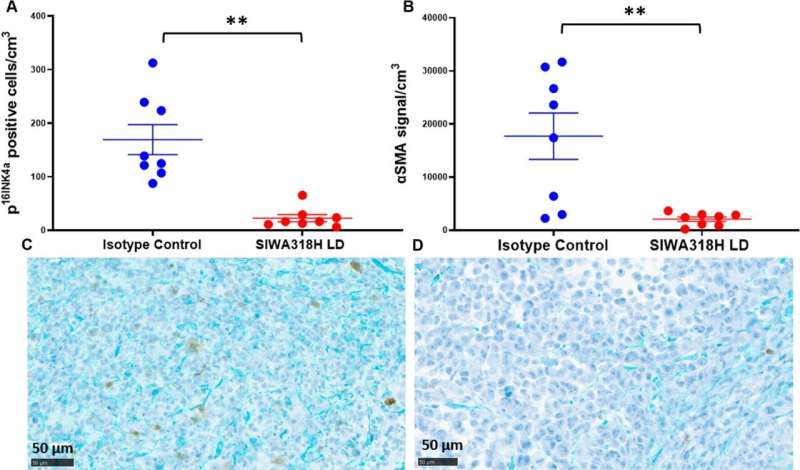This article has been reviewed according to Science X's editorial process and policies. Editors have highlighted the following attributes while ensuring the content's credibility:
fact-checked
peer-reviewed publication
trusted source
proofread
New antibody shows strong potential as treatment against pancreatic cancer

Scientists have recently concluded a preclinical study that highlights the potential of SIWA318H, an advanced glycation end product (AGE)-targeting antibody, in the fight against pancreatic cancer. The results are published in Scientific Reports.
Pancreatic cancer, especially pancreatic ductal adenocarcinoma (PDAC), has long been known for its aggressive nature and resistance to current treatment options. SIWA318H's ability to selectively target senescent cells represents a new approach to treating the disease.
Senescent cells within the tumor microenvironment have been identified as major contributors to tumor development, growth and therapy resistance. SIWA318H, an antibody specifically designed to target AGEs, offers a novel approach to eliminate these senescent cells and reshape the tumor microenvironment.
"These pre-clinical results suggest that SIWA318H is a promising new therapeutic against pancreatic cancer," said Lewis S. Gruber, CEO and co-founder of SIWA Therapeutics. "By reshaping the tumor microenvironment, our goal is to improve the efficacy of cancer treatments and potentially lead to better patient outcomes."
The study's key findings reveal that SIWA318H has a remarkable ability to specifically attach itself to modified proteins associated with aging and cancer progression. It targets senescent cells, which are linked to these health issues, both in vitro and within living organisms. This ability to target senescent cells is an important part of how the drug works. Additionally, SIWA318H can trigger a process called antibody-dependent cell-mediated cytotoxicity (ADCC), which helps the immune system eliminate cancer cells.
In a study involving mice with pancreatic cancer, those treated with SIWA318H saw a significant reduction in tumor growth, increased survival, and an increased rate of complete remission compared to mice treated with a control antibody. Furthermore, the tumors treated with SIWA318H showed fewer senescent cells and less profibrotic cells, indicating a positive impact on the tumor's surrounding environment.
"SIWA318H's ability to selectively target senescent cells, coupled with its demonstrated efficacy in preclinical models, offers a glimmer of hope for a new approach to tackling this formidable disease," said Haiyong Han, Ph.D., a professor in the Molecular Medicine Division at TGen and the study's senior author.
These findings also suggest that SIWA318H holds promise for potential use in combating aging-related issues and cancer.
More information: Gabriela R. Rossi et al, Advanced glycation end product (AGE) targeting antibody SIWA318H is efficacious in preclinical models for pancreatic cancer, Scientific Reports (2023). DOI: 10.1038/s41598-023-44211-6





















